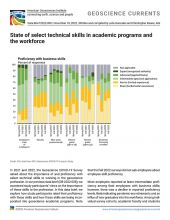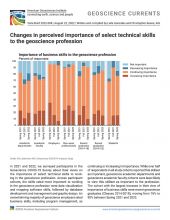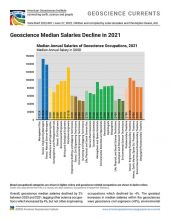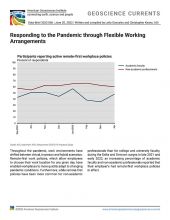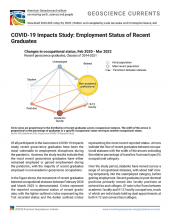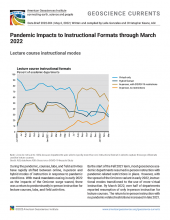In April 2021, we asked survey participants in the AGI Geoscience COVID-19 Impacts study if their work and/or research productivity had been negatively impacted by caregiving and other domestic responsibilities, and if they had reduced their work / research hours because of these responsibilities.
More academic faculty reported productivity impacts from caregiving and domestic responsibilities than did non-academic geoscientists (56% vs. 26%) with the largest disparities in impacts occurring in household management (38% of academic faculty vs. 20% of non-academic geoscientists) and childcare (28% of academic faculty vs. 12% of non-academic geoscientists). Impacts to productivity from eldercare were reported by 11% of academic faculty and 6% of non-academic geoscientists.
More female faculty reported negative impacts to productivity from household management and childcare than male faculty (47% vs. 24% and 35% vs. 16%, respectively), and more male faculty reported negative impacts related to eldercare than did female faculty (14% vs. 9%).
For non-academic geoscientists, more women reported negative impacts to productivity than men (30% vs. 22%). The difference in percentage of female and male non-academic geoscientists reporting negative impacts from caregiving and domestic responsibilities was smaller than for academic faculty. While 15% of female non-academic geoscientists reported impacts from childcare, 9% of male non-academic geoscientists reported the same. Negative impacts related to household management and eldercare were similar between male and female non-academic geoscientists, with slightly more females reporting negative impacts (21% vs 19% and 7% vs. 4% respectively).
Just over one-quarter of academic faculty and one-tenth of non-academic geoscientists reported that they reduced their work hours due to caregiving or other domestic responsibilities. Childcare was the top reason for reducing hours, with 20% of academic faculty and 6% of non-academic geoscientists reporting this reason. A much smaller percentage of participants indicated reducing their work hours because of other domestic responsibilities (11% faculty vs. 5% non-academic geoscientists) and eldercare (5% faculty vs. 2% non-academic geoscientists).
A higher percentage of women reduced their work hours due to caregiving and domestic responsibilities than did men, with nearly one-third of female academic faculty and 16% of female non-academic geoscientists reporting a reduction in work hours.
More female non-academic geoscientists reported reducing their work hours than did male non-academic geoscientists across all categories (10% vs. 3% childcare, 4% vs 0% eldercare, 7% vs. 3% other domestic responsibilities). For academic faculty, 25% of female faculty reported reducing their work hours due to childcare compared to 14% of male faculty, and 15% reported reducing their work hours because of other domestic responsibilities, compared to 7% of male faculty. The percentage of faculty reducing work hours due to eldercare was the same between female and male faculty (5%).
We will continue to provide current snapshots on the impacts of COVID-19 on the geoscience enterprise throughout the year. For more information, and to participate in the study, please visit: www.americangeosciences.org/workforce/covid19
Funding for this project is provided by the National Science Foundation (Award #2029570). The results and interpretation of the survey are the views of the American Geosciences Institute and not those of the National Science Foundation.





